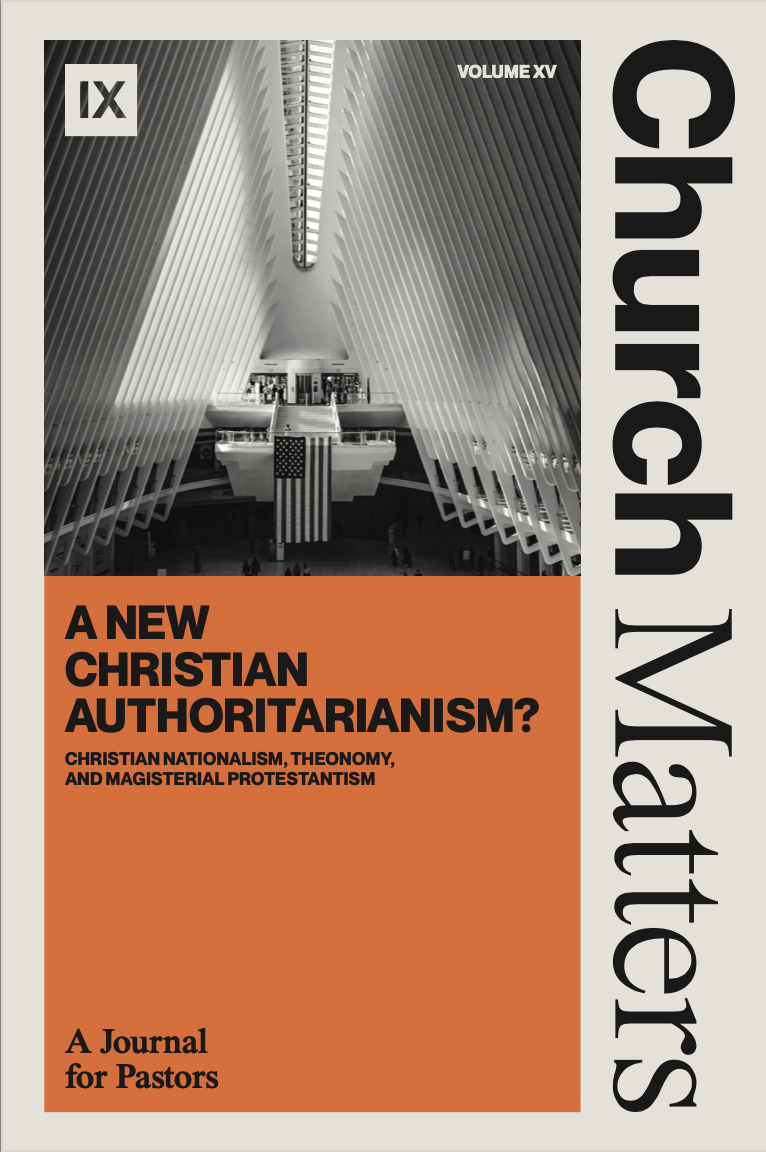Baptist Covenant Theology: A Pastor’s Best Defense Against Theonomy
“If we knew this is what you taught before we joined the church, we probably wouldn’t have joined,” remarked a dear saint to me before submitting a membership resignation.
Years of growing doctrinal dissonance between him and our church’s public teaching led to this meeting. I replied, “If we knew what you believed, then we would have slowed down before bringing you into our membership.”
To my brother’s credit, the conversation was amicable despite exasperation on both sides.
The disputed matter concerned the perpetuity of Old Testament laws and their application to Christians and culture. My brother believed that most, if not all, Old Testament laws were still binding today, especially those governing Israel’s civil life. After all, Jesus taught, “Until heaven and earth pass away, not an iota, not a dot, will pass from the Law until all is accomplished” (Matt. 5:18).
Resolving myriad disagreements on how to interpret our Lord’s teaching is not the aim of this essay. Yet the illustration above highlights the challenge of Theonomy and Reconstruction (TheoRecon) and other related errors for Baptist pastors today, especially in Calvinistic or confessionally Reformed churches.
Moreover, in the face of today’s so-called “culture war,” TheoRecon teachers often take bold stands on social issues that attract anxious evangelicals. Drawing from an “optimistic” postmillennial eschatology and a presuppositionalist apologetic, TheoRecon sells as an attractive alternative to supposedly “retreatist” evangelical pietism. How, then, can pastors guide and guard their sheep from possible error?
Before I offer suggestions, allow me to put my cards on the table. First, I am writing from the conviction that TheoRecon is a theological error that Baptists cannot consistently maintain. Second, many Baptists tolerate this error, partly due to ignorance or neglect of distinctly Baptist covenant theology in our churches. Finally, this ignorance may reflect pastoral leadership and practice.
I’ll leave it to more able-minded writers in this Journal to defend the first and second points above. I aim to address the lattermost issue by considering prudential practices that may help guard pastors and congregations against doctrinal error and equip church members to grow in godly discernment. I primarily address pastors in the five considerations that follow, but non-pastors may find them helpful as well.
TO GUIDE AND GUARD
1. Pastor, Assume the Best of Others.
Even in disagreement, assume that most TheoRecon teachers and all your sympathetic church members are motivated by a desire to obey God through the correct application of God’s law to their lives.
Praise God for these motivations! Assume the best.
But remember that good motives don’t necessarily produce good theology. Consider wise ways to follow a gracious commendation with godly correction where necessary, which leads me to my next point.
2. Pastor, Correct Gently.
Christ has appointed pastors to teach sound doctrine and correct what contradicts it (Titus 1:9). Correction is a necessary part of Word ministry. This means when we correct doctrinal errors, we must do so knowledgeably, avoiding lazy generalizations and straw-man arguments.
Not only that, pastors must also resist a quarrelsome spirit and correct others with gentleness (2 Tim. 2:23–25). Some of the brazen and provocative rhetoric that often accompanies TheoRecon polemics may tempt you to respond in kind. Ask God to help you distinguish correcting from quarreling. As you do, consider resources that strengthen your polemical ministry, beginning with your church’s confession.
3. Pastor, Consider Your Confession.
TheoRecon is a law-gospel error that folds too much Old Covenant into the New, positing continuity where Baptists (and most Presbyterians) traditionally assert discontinuity. Some of our church members are unable to discern this inconsistency, partly due to ignorance of Baptist covenant theology. They’re content to simply add Theonomy to preexisting Baptist convictions.
But this isn’t unique. Evangelical Christians commonly treat doctrines like marbles in a bag, to be added or removed at will. It’s unsurprising when some wind up with an oxymoron like “Baptist Theonomist.”
A good church confession, however, resists this by functioning more like an interconnected, organic body of divinity. For example, the Baptist Faith and Message (2000) contains no explicit statement on the covenants, but its expressions of credobaptism, regenerate church membership, and the Lord’s Day, to name a few, are inferred from a variety of covenantal theology that assumes significant discontinuity between the Old and New Covenants.
Do your members know your church’s confession? Does it inform your teaching and assist you in disputes and controversy? A well-worn, time-tested Baptist confession is one of the best defenses against law-gospel errors like TheoRecon.
4. Pastor, Strengthen Your Membership Process.
Three words from my opening illustration haunt me: “If we knew . . .”
One lesson I’ve since learned is the importance of doctrinal specificity in the membership process. Meaningful membership guards the front door of the church. Ambiguity weakens a church’s defense system. Error loves to invade through ambiguity. Or, as John Calvin pointedly remarked, “Ambiguity is the fortress of heretics.” Knowing this helps to strengthen a church’s membership process, including but not limited to the following ways:
First, when leading a membership class, teach the confession’s explicit affirmations and its implicit denials. Doing so includes being clear about the implications of our church’s covenant theology, including law-gospel distinctions that necessarily oppose TheoRecon.
Second, as you meet with prospective members in casual meetings or membership interviews, find ways to discern their agreement with your church. You might ask, “Who are your favorite Christian teachers?” or “Who are some of your theological influences?” An attentive pastor can tell a lot from answers to these questions.
I’ll give you an example: a dear brother who aspired to pastoral ministry visited our church with an interest in membership. When we talked about his influences, he mentioned certain Christian teachers associated within the TheoRecon and Biblical Patriarchy camps. Assuming the best of him and the named teachers, I told him what he could expect from the public teaching ministry of our church, how it would inevitably oppose their teaching on certain issues, and that his ministerial preparation in our church would be hindered if he was unwilling to change his views over time. He later joined a nearby church with whom he remained for only a short time before leaving over doctrinal differences. Perhaps the Lord will grant our brother fruitful ministry in a like-minded church. But for our sake, a stronger, more explicit membership process likely guarded our congregation from similar disputes.
5. Pastor, Study (Baptist) Covenant Theology.
I’ve argued in this article that distinctly Baptist covenant theology is the best defense against law-gospel errors such as TheoRecon. It helps pastors preach Christ from all of Scripture and undergirds many of our Baptist distinctives. Thus, our flocks benefit when we give ourselves to studying the covenantal framework of the Bible.
To this end, good guides abound. Helpful resources include God’s Kingdom Through God’s Covenants by Steven Wellum and Peter Gentry (Calvinistic Baptist) and The Mystery of Christ, His Kingdom, and His Covenant by Samuel Renihan (1689 Federalism). These introductions to Baptist covenant theology disagree on important points but are nevertheless united in maintaining an appropriate discontinuity between the Old and New Covenants.
CONCLUSION
In my experience, Baptists stumble into TheoRecon mostly through the backdoor of postmillennialism and presuppositionalism, but never the front door of covenant theology. Against the backdrop of contemporary culture wars, TheoRecon offers a compelling vision for “all of life” Christian engagement that seems absent in evangelical pietism.
Yet this attractive vision for cultural engagement often keeps Baptist sympathizers ambivalent toward the necessary consequences of TheoRecon for Baptist theology. Inevitably, the Baptist must either reject his own Baptist tradition or live comfortably with known doctrinal inconsistency, which no serious student of the Bible should be able to do for long. Either way, TheoRecon is a position that no Baptist can consistently maintain.
Therefore, a Baptist pastor concerned about TheoRecon wisely commits himself to at least three things:
First, he studies the commitments and consequences of TheoRecon in order to interact with the position accurately and in good faith. This Journal is a good place to start. Second, he’s explicit about Baptist covenant theology and its implications for proper law-gospel distinctions. Finally, fearing the Lord above all, he corrects TheoRecon errors with gentleness and patience when necessary—all to the glory of God and the good of his flock.









